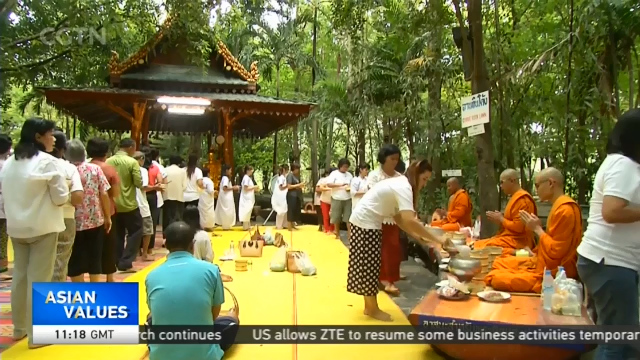
19:38, 04-Jul-2018
Buddhist Culture: Philosophy pivotal to Thailand's resilience
Updated
19:26, 07-Jul-2018
02:57

Buddhism is an ancient religion – but in Thailand its values have stayed relevant to modern life. Principles such as hard work, moderation and consideration of the common good have given the country strength in both good times and bad. Martin Lowe visited a Buddhist temple near Bangkok to learn more.
Thailand is often described as the world's most Buddhist nation – with almost 95 per cent of the population said to follow Buddha's teachings.
Pornwatchara, who's 21, is about to interrupt his university studies to spend a month as a monk.
It's a tradition followed by almost all Thai men to live at a temple for between two weeks and a year and learn Buddhist principles. It brings credit to the family, is seen as an indication of suitability for marriage and is a requirement for some positions in public life.
It can also provide clarity in times of strife.
PORNWATCHARA YUEAKNGERN UNIVERSITY STUDENT "At times I have had difficulties and I can't see the answer. I feel if I become a monk and follow the teachings of Buddha, it may help me to understand things in a better way."
Like most countries, Thailand has had its upheavals. The 1997 Asian financial crisis had its roots here, followed by more than a decade of political protests ended by a military coup - and in 2016 the death of a much-loved monarch who'd reigned for seven decades.
Many see Thailand's Buddhist values as pivotal to its resilience.
PHRA PHAYOM KALYANO ABBOT, SUAN KAEW TEMPLE "Buddhism teaches us to stay composed. In life, sometimes you will win and sometimes you will lose. If your soul is well-trained when you win, you will be modest, and when you lose you won't get too upset – you will be able to deal with any situation."
MARTIN LOWE BANGKOK "Thailand's late king Bhumipol Adulyadej promoted the practice of self-sufficiency, which is in line with Buddhist teachings of modesty and thrift – and many also point to Buddhism's philosophy of calmness in the face of adversity, as giving Thais the ability to ride out troubles and hard times."
Buddhism shares many beliefs with Chinese Confucianism, such as collective well-being rather than individual advancement, and 'filial piety' which is respect for elders.
Qualities that have consistently helped this country weather economic downturn and political uncertainty, so much so it's often referred to as 'Teflon Thailand' – a place where the bad times never seem to stick for too long. Martin Lowe CGTN, Bangkok.

SITEMAP
Copyright © 2018 CGTN. Beijing ICP prepared NO.16065310-3
Copyright © 2018 CGTN. Beijing ICP prepared NO.16065310-3